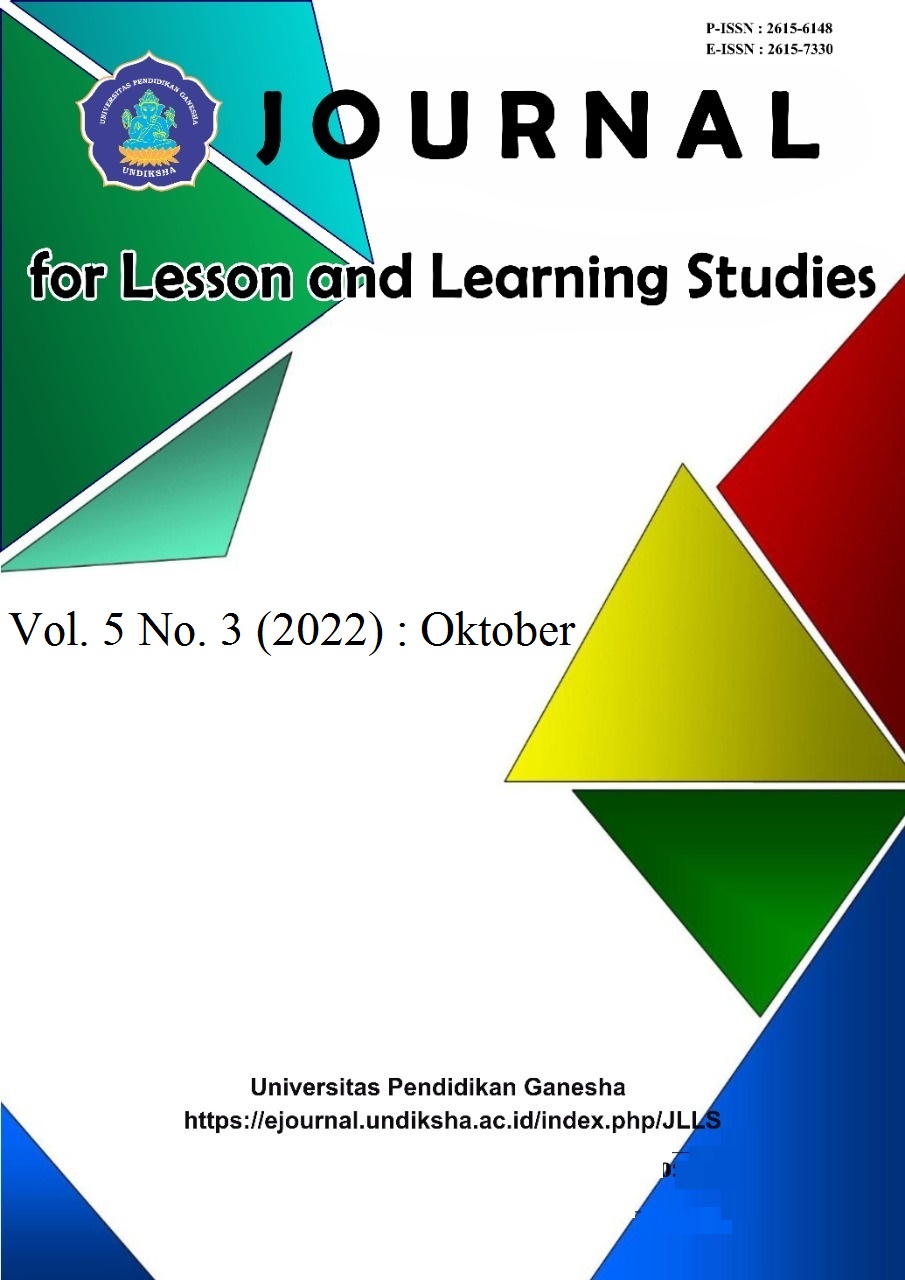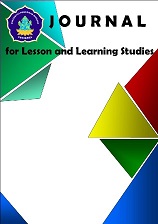Flipbook Based E-Module With Case Method In Vehicle Testing Course
DOI:
https://doi.org/10.23887/jlls.v5i3.57186Keywords:
E-Modul, flipbook, automotive engineeringAbstract
The rapid development of ICT (Information and Communication Technology) affects various aspects of human life including education. Utilizing this information technology can support the independent learning process for the better. E-module with the case method model is suitable media implementing in Technology and Vocational Education. This study aims to analyse the validity of E-module with case method in vehicle testing course the expert before being implemented in the learning process. This study used a quantitative research in the form of a survey. The validity of this research is divided into two categories, namely design validity and material validity. Data collection is using questionnaire in a form of Likert scale with five possible answers is used in this media validation questionnaire. The data analysis in this study is use level of validity according to Formula V Aiken. Based on the results of the study, it can be concluded that media design is valid in terms of didactic, construction and technical aspects. While the results of material validation also show that the material in the media is valid in terms of the quality of the material and the quality of learning. It can be concluded that the flipbook-based e-module with the case method used in this course is effective as a learning medium in the classroom during the learning process.
References
Anas, A., & Mujahidin, E. (2022). Implementasi Konsep 4c Dalam Pembelajaran Pada Mata Kuliah Analisis Kebijakan Pendidikan. Tadbiruna, 2(1), 1–13. https://doi.org/10.51192/tadbiruna.v2i1.356. DOI: https://doi.org/10.51192/tadbiruna.v2i1.356
Arthur, R., Dwi, R. N., & Lenggogeni, L. (2020). E-Module of Cost Estimating Course in Building Construction Vocational Undergraduate Program Faculty of Engineering Universitas Negeri Jakarta. Jurnal Ilmu Pendidikan, 25(2), 88. https://doi.org/10.17977/um048v25i2p88-96. DOI: https://doi.org/10.17977/um048v25i2p88-96
Fahmi, S., Priwantoro, S. W., Cahdriyana, R. A., Hendroanto, A., Rohmah, S. N., & Nisa, L. C. (2019). Interactive Learning Media Using Kvisoft Flipbook Maker for Mathematics Learning. Journal of Physics: Conference Series, 1188(1). https://doi.org/10.1088/1742-6596/1188/1/012075. DOI: https://doi.org/10.1088/1742-6596/1188/1/012075
Hidayatullah, Z., Wilujeng, I., Nurhasanah, N., Gusemanto, T. G., & Makhrus, M. (2021). Synthesis of the 21st Century Skills (4C) Based Physics Education Research In Indonesia. JIPF (Jurnal Ilmu Pendidikan Fisika), 6(1), 88. https://doi.org/10.26737/jipf.v6i1.1889. DOI: https://doi.org/10.26737/jipf.v6i1.1889
Junedi, B., Mahuda, I., & Kusuma, J. W. (2020). Optimalisasi keterampilan pembelajaran abad 21 dalam proses pembelajaran pada Guru MTs Massaratul Mut’allimin Banten. Transformasi: Jurnal Pengabdian Masyarakat, 16(1), 63–72. https://doi.org/10.20414/transformasi.v16i1.1963. DOI: https://doi.org/10.20414/transformasi.v16i1.1963
Komikesari, H., Mutoharoh, M., Dewi, P. S., Utami, G. N., Anggraini, W., & Himmah, E. F. (2020). Development of E-Module Using Flip Pdf Professional on Temperature And Heat Material. In Journal of Physics: Conference Series, 1572(1), 012017. https://doi.org/10.1088/1742-6596/1572/1/012017. DOI: https://doi.org/10.1088/1742-6596/1572/1/012017
Logan, R. M., Johnson, C. E., & Worsham, J. W. (2020). Development of an E-learning Module to Facilitate Student Learning and Outcomes. Teaching and Learning in Nursing, 00, 139–142. https://doi.org/10.1016/j.teln.2020.10.007. DOI: https://doi.org/10.1016/j.teln.2020.10.007
Maharcika, A. A. M., Suarni, N. K., & Gunamantha, I. M. (2021). Pengembangan Modul Elektronik (E-Modul) Berbasis Flipbook Maker Untuk Subtema Pekerjaan Di Sekitarku Kelas Iv Sd/Mi. PENDASI: Jurnal Pendidikan Dasar Indonesia, 5(2), 165–174. https://doi.org/10.23887/jurnal_pendas.v5i2.240. DOI: https://doi.org/10.23887/jurnal_pendas.v5i2.240
Mardiana, H. (2020). Lecturers’ Adaptability to Technological Change and Its Impact on The Teaching Process. JPI (Jurnal Pendidikan Indonesia), 9(2), 275–289. https://doi.org/10.23887/jpi-undiksha.v9i2.24595. DOI: https://doi.org/10.23887/jpi-undiksha.v9i2.24595
Mendenhall, W. M., & Sincich, T. L. (2016). Statistics for engineering and the sciences, sixth edition. In Statistics for Engineering and the Sciences, Sixth Edition. https://doi.org/10.1080/00224065.2016.11918168. DOI: https://doi.org/10.1201/b19628
Mulyadi, M., Atmazaki, A., & Syahrul, R. (2019). The Development of Interactive Multimedia E-Module on Indonesia Language Course. In 1st International Conference on Innovation in Education (ICoIE 2018), 291–295. https://doi.org/10.2991/icoie-18.2019.65. DOI: https://doi.org/10.2991/icoie-18.2019.65
Munawarah, M. (2019). Pengaruh Kompetensi Pedagogik Dosen Terhadap Motivasi Belajar Mahasiswa Pada Mata Kuliah Statistik Deskriptif Program Studi Ekonomi Islam Jurusan Syariah dan Ekonomi Islam Stain Watampone. Ekspose: Jurnal Penelitian Hukum Dan Pendidik, 17(2), 672–682. https://www.jurnal.iain-bone.ac.id/index.php/ekspose/article/download/123/71. DOI: https://doi.org/10.30863/ekspose.v17i2.123
Nilsook, P., Chatwattana, P., & Seechaliao, T. (2021). The Project-based Learning Management Process for Vocational and Technical Education. Higher Education Studies, 11(2), 20–29. https://doi.org/10.5539/hes.v11n2p20. DOI: https://doi.org/10.5539/hes.v11n2p20
Nurtanto, M., Pardjono, P., Widarto, W., & Ramdani, S. D. (2020). The effect of STEM-EDP in professional learning on automotive engineering competence in vocational high school. Journal for the Education of Gifted Young Scientists, 8(2), 633–649. https://doi.org/10.17478/JEGYS.645047. DOI: https://doi.org/10.17478/jegys.645047
Prayogi, Rayinda Dwi; Estetika, R. (2019). Kecakapan Abad 21: Kompetensi Digital Pendidik Masa Depan. Jurnal Manajemen Pendidikan: Universitas Muhammadiyah Surakarta, 14(2), 144–151. https://doi.org/10.15330/jpnu.5.1.40-46. DOI: https://doi.org/10.23917/jmp.v14i2.9486
Pujilestari, Y. (2020). Dampak positif pembelajaran online dalam sistem pendidikan Indonesia pasca pandemi covid-19. Adalah, 4(1), 49–56. https://doi.org/10.15408/adalah.v4i1.15394. DOI: https://doi.org/10.32584/jpi.v4i3.555
Qekaj-Thaqi, A., & Thaqi, L. (2021). The Importance of Information and Communication Technologies (ICT) during the COVID-19—Pandemic in Case of Kosovo (Analytical Approach of Students Perspective). OALib, 08(07), 1–15. https://doi.org/10.4236/oalib.1106996. DOI: https://doi.org/10.4236/oalib.1106996
Rahmi, L. (2018). Perancangan E-Module Perakitan Dan Instalasi Personal Komputer Sebagai Media Pembelajaran Siswa SMK. TA’DIB, 21(2), 105–111. https://doi.org/10.31958/jt.v21i2.1190. DOI: https://doi.org/10.31958/jt.v21i2.1190
Ritonga, A. K. (2022). Pengembangan dan Pembinaan Karir Guru di bidang Pendidikan Kejuruan. JISIP (Jurnal Ilmu Sosial Dan Pendidikan), 6(2). https://doi.org/10.58258/jisip.v6i2.3042. DOI: https://doi.org/10.58258/jisip.v6i2.3042
Riyanda, A. R., & Suana, W. (2019). Pengembangan Modul Pembelajaran Pemrograman Dasar Berbasis Adobe Flash CS6 Bagi Siswa Kelas XI RPL. Jurnal Pendidikan Teknologi Informasi Dan Vokasional, 1(2). https://doi.org/10.23960/jpvti.v1.i2.201901. DOI: https://doi.org/10.23960/jpvti.v1.i2.201901
Riyanto, Amin, M., Suwono, H., & Lestari, U. (2020). The new face of digital books in genetic learning: A preliminary development study for students’ critical thinking. International Journal of Emerging Technologies in Learning, 15(10), 175–190. https://doi.org/10.3991/ijet.v15i10.14321. DOI: https://doi.org/10.3991/ijet.v15i10.14321
Sa’diyah, K. (2021). Pengembagan E-Modul Berbasis Digital Flipbook Untuk Mempermudah Pembelajaran Jarak Jauh Di SMA. Edukatif: Jurnal Ilmu Pendidikan, 3(4), 1298–1308. https://doi.org/10.31004/edukatif.v3i4.561. DOI: https://doi.org/10.31004/edukatif.v3i4.561
Saraswati, S., Linda, R., & Herdini, H. (2019). Development of Interactive E-Module Chemistry Magazine Based on Kvisoft Flipbook Maker for Thermochemistry Materials at Second Grade Senior High School. Journal of Science Learning, 3(1), 1–6. https://doi.org/10.17509/jsl.v3i1.18166. DOI: https://doi.org/10.17509/jsl.v3i1.18166
Suarsana, I. M., & Mahayukti, G. A. (2013). Pengembangan E-Modul Berorientasi Pemecahan Masalah Untuk Meningkatkan Keterampilan Berpikir Kritis Mahasiswa. Jurnal Nasional Pendidikan Teknik Informatika (JANAPATI), 2(3), 193. https://doi.org/10.23887/janapati.v2i3.9800. DOI: https://doi.org/10.23887/janapati.v2i3.9800
Sugianto, D., Abdullah, A. G., Elvyanti, S., & Muladi, Y. (2013). Modul virtual: Multimedia flipbook dasar teknik digital. Invotec, 9(2). https://doi.org/10.17509/invotec.v9i2.4860. DOI: https://doi.org/10.17509/invotec.v9i2.4860
Sujanem, R., Nyoman Putu Suwindra, I., & Suswandi, I. (2020). The Effectiveness of Problem-Based Interactive Physics E-Module on High School Students’ Critical Thinking. Journal of Physics: Conference Series, 1503(1). https://doi.org/10.1088/1742-6596/1503/1/012025. DOI: https://doi.org/10.1088/1742-6596/1503/1/012025
Tarihoran, E. (2019). Guru dalam pengajaran abad 21. SAPA-Jurnal Kateketik Dan Pastoral, 4(1), 46–58. https://doi.org/10.53544/sapa.v4i1.68. DOI: https://doi.org/10.53544/sapa.v4i1.68
Verner, I., Massarwe, K., & Bshouty, D. (2013). Constructs of engagement emerging in an ethnomathematically-based teacher education course. Journal of Mathematical Behavior, 32(3), 494–507. https://doi.org/10.1016/j.jmathb.2013.06.002. DOI: https://doi.org/10.1016/j.jmathb.2013.06.002
Wibowo, E., & Pratiwi, D. D. (2018). Pengembangan Bahan Ajar Menggunakan Aplikasi Kvisoft Flipbook Maker Materi Himpunan. Desimal: Jurnal Matematika, 1(2), 147. https://doi.org/10.24042/djm.v1i2.2279. DOI: https://doi.org/10.24042/djm.v1i2.2279
Widayanti, Y. (2020). Meningkatkan Hasil Belajar Peserta Didik dengan Modul Pembelajaran Berbasis Problem Based Learning (PBL). Jurnal Pendidikan Ekonomi Undiksha, 12(1). https://doi.org/10.23887/jjpe.v12i1.25648. DOI: https://doi.org/10.23887/jjpe.v12i1.25648
Widiastuti, F., Amin, S., & Hasbullah, H. (2022). Efektivitas Metode Pembelajaran Case Method dalam Upaya Peningkatan Partisipasi dan Hasil Belajar Mahasiswa pada Mata Kuliah Manajemen Perubahan. Edumaspul: Jurnal Pendidikan, 6(1), 728–731. https://doi.org/10.33487/edumaspul.v6i1.3034. DOI: https://doi.org/10.33487/edumaspul.v6i1.3034
Wijaya, S. A. & J. (2021). Developing Kvisoft Flipbook Maker-Based Physics E-Module to Build on Critical Thinking Skills of Senior High School Students. In 6th International Seminar on Science Education (ISSE 2020), 515–521. https://doi.org/10.2991/assehr.k.210326.074. DOI: https://doi.org/10.2991/assehr.k.210326.074
Winangun, K. (2017). Pendidikan vokasi sebagai pondasi bangsa menghadapi globalisasi. Jurnal Taman Vokasi, 5(1), 72–78. https://doi.org/10.30738/jtv.v5i1.1493. DOI: https://doi.org/10.30738/jtvok.v5i1.1493
Yang, S., Fichman, P., Zhu, X., Sanfilippo, M., Li, S., & Fleischmann, K. R. (2020). The use of ICT during COVID ‐19 . Proceedings of the Association for Information Science and Technology, 57(1), 1–5. https://doi.org/10.1002/pra2.297. DOI: https://doi.org/10.1002/pra2.297
Yulando, S., Sutopo, S., & Franklin Chi, T. (2019). Electronic Module Design and Development: An Interactive Learning. American Journal of Educational Research, 7(10), 694–698. https://doi.org/10.12691/education-7-10-4. DOI: https://doi.org/10.12691/education-7-10-4
Downloads
Published
How to Cite
Issue
Section
License
Copyright (c) 2023 Ananda Jaka Kelana

This work is licensed under a Creative Commons Attribution-ShareAlike 4.0 International License.
Authors who publish with the Journal for Lesson and Learning Studies agree to the following terms:
- Authors retain copyright and grant the journal the right of first publication with the work simultaneously licensed under a Creative Commons Attribution License (CC BY-SA 4.0) that allows others to share the work with an acknowledgment of the work's authorship and initial publication in this journal.
- Authors are able to enter into separate, additional contractual arrangements for the non-exclusive distribution of the journal's published version of the work (e.g., post it to an institutional repository or publish it in a book), with an acknowledgment of its initial publication in this journal.
- Authors are permitted and encouraged to post their work online (e.g., in institutional repositories or on their website) prior to and during the submission process, as it can lead to productive exchanges, as well as earlier and greater citation of published work. (See The Effect of Open Access)





